William
Seward
America's Unsung Hero
Story
written by Rick Archer
June 2013
William Seward was the
man who made Alaska a part of the
United States in 1867.
Seward was able to
bring this vast territory to the growing
United States without firing a single bullet
or making an enemy. Even better,
Seward got a good price - 2 cents an acre.
all Seward
had to show for his brilliant move was
scathing ridicule. Calling it
"Seward's Folly", the newspapers turned
Seward into the nation's laughingstock. Sad
to say, Seward was used to it. For much of his life,
William Seward was a hated man and much
criticized. That's pretty strange.
After you read his story, you might consider
Seward to be a national hero.
This ridicule was a
shame because Seward deserved better. Although the Alaska
Purchase was the highlight of Seward's
career, he had an illustrious career. Seward
was the "Henry Kissinger" of his day.
He played a huge role in the Lincoln
Administration. Without Seward at his
side, Abraham Lincoln would have been
hard-pressed to succeed.
|
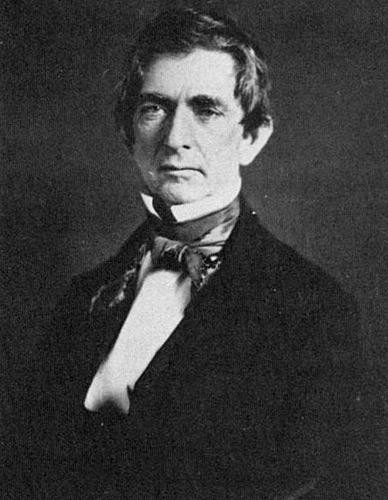 |
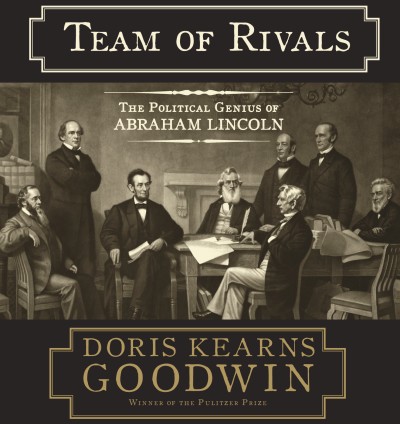 |
Seward and Lincoln
Seward's name
has resurfaced recently thanks to Spielberg's award-winning
movie Lincoln. The movie was based Doris
Goodwin's brilliant novel Team of Rivals. As
one might gather, Dr.
Goodwin's title referred directly to the
powerful interaction between Seward and
Lincoln, once enemies who became friends.
Let's summarize
what the book was about. During his early political career, William
Seward
received a lot of practice at dealing
with hatred. Like Lincoln, Seward
was totally opposed to slavery and didn't mind letting
anyone know about it. Seward presented himself
as the leading enemy of the Slave Power –
that is, the perceived conspiracy of
southern slave owners to seize the
government and defeat the progress of
liberty.
Seward had other liberal views
that were almost as unpopular. He was an advocate of prison reform and
better treatment for the insane.
Seward sought to prevent certain men from being
executed by using the relatively new defense
of "insanity".
In a landmark case involving mental
illness as well as racial overtones, Seward
argued:
"The color of the prisoner’s skin,
and the form of his features, are not
impressed upon the spiritual immortal mind
which works beneath. In spite of human
pride, he is still your brother, and mine,
in form and color accepted and approved by
his Father, and yours, and mine, and bears
equally with us the proudest inheritance of
our race—the image of our Maker.
Hold him
then to be a Man."
|
Seward supported personal liberty laws and
was a virulent opponent of the Fugitive Slave Act.
Seward and his wife Frances were deeply
committed to the abolitionist movement. In the 1850s, the Seward
family opened their Auburn home as a safehouse to fugitive slaves.
In addition, Seward often defended runaway slaves in court.
Seward believed that slavery was morally
wrong. He said so many times, a position
that never failed to outrage
Southerners.
Seward acknowledged that slavery
was legal under the Constitution, but at the
same time he denied that the Constitution recognized
or protected slavery.
In 1850, Seward
exclaimed "there is a higher law
than the Constitution". That
statement gave him his first taste of public ridicule. Now known as "Higher Law Seward", he
continued to argue this point of view over
the next decade. He was despised by
the leaders of the South.
Fortunately, Seward didn't let the scorn and
hatred stop him. He was a principled
man and not easily intimidated.
|
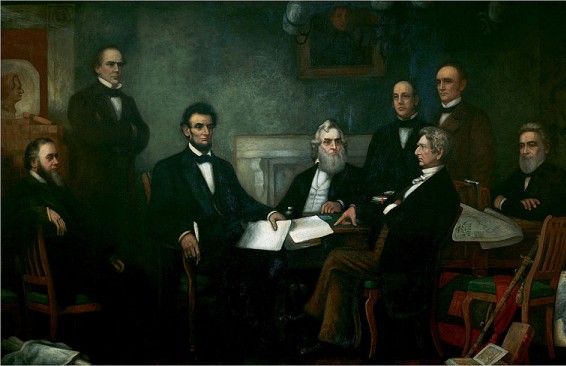 |
|
As the title of Doris Goodwin's book suggests, Seward and
Lincoln started out as political rivals. Despite
their similar philosophies, they stayed
apart because they were both fighting for the same job.
As Governor of New York, Seward assumed he had the
inside track on the Presidency because he was the choice of
the powerful New York delegation. But
Lincoln edged him out.
|
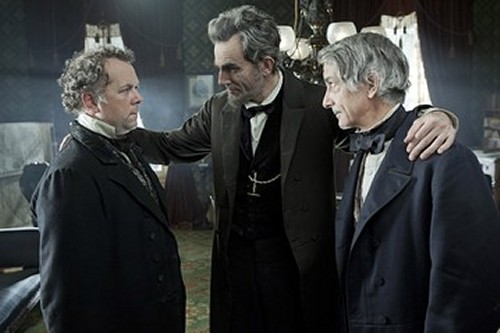 |
Like many in his party, Seward was shocked
when he lost the Presidential nomination to
Abraham Lincoln, whom he furiously described
as “that little Illinois lawyer.” That
was probably the only time in his career the angular 6' 4"
Lincoln was ever described as little!
Fortunately Seward had a trait that was rare in
Washington: the ability to curb his rancor.
Despite his deep disappointment at losing
the nomination, Seward was a patriot at
heart. He threw himself into
campaigning for Lincoln. Perhaps more
than anyone, Seward's influential support helped secure
Lincoln's narrow victory in 1860.
Lincoln had been paying attention.
A formidable opponent might make a formidable ally.
Soon after his inauguration, he asked Seward
to become his Secretary of State.
Seward didn't know Lincoln very well and was
taken by surprise. However, as he and
Lincoln talked, Seward realized that both
men wanted the same things for the country.
Seward knew the nation was in for tough
times and wanted to help. So he readily
accepted the offer.
|
|
|
|
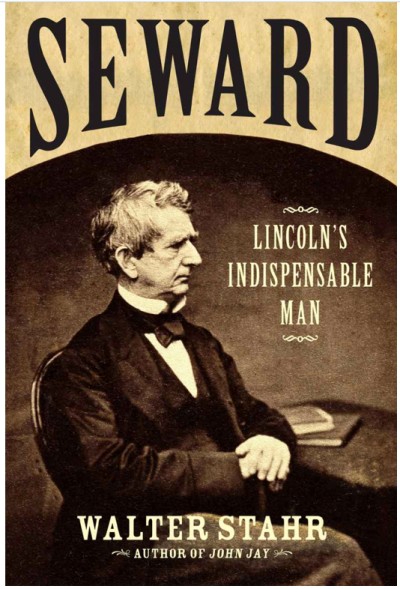 |
That was
the start of a remarkably successful
collaboration between the President and his
Secretary of State. Lincoln told
Seward early on, “I shall have to depend
upon you for taking care of these matters of
foreign affairs, of which I know so little,
and with which I reckon you are familiar.”
Seward joined his rival's cabinet and became
a real power in the Administration.
Seward was indeed very knowledgeable about
foreign affairs and acquitted himself well. He was particularly credited with the tricky
maneuvering necessary to keep England and
France from entering the war on the side of
the Confederacy.
Seward proved to be
the cagey political veteran. As Lincoln recognized his skill,
the President began to depend on Seward more
and more. Lincoln consulted Seward
regularly for
advice and help on a wide variety of
problems.
From that point on, William Seward became
the President's most valuable friend and ally.
Seward's contributions to the Lincoln Presidency
were immense during the Civil War years.
There were times when he practically ran the
White House himself when Lincoln traveled to
the war zone for a first-hand look at what
was happening. Plus Seward ran
Lincoln's re-election campaign.
Pulling all sorts of strings within his own
important New York delegation, Seward was
instrumental in helping Lincoln get
re-elected in 1865.
Most people today were unaware of the
significant role that Seward played in helping Lincoln pass the critical
Thirteenth Amendment which permanently outlawed slavery.
Their collaboration was vital in getting
this controversial law passed.
As the movie Lincoln explained,
though the slaves had been declared free by
Lincoln's 1863 Emancipation Proclamation,
their post-war status was uncertain. Lincoln
feared the next President could turn around
and make slavery legal again.
Unfortunately the passage of this bill was a
huge uphill struggle.
In
mid-January of 1865,
Speaker of the House Schuyler Colfax
estimated the amendment to be five votes
short of passage. Sensing
a sure defeat, Ashley postponed the
vote.
|
At this point, Lincoln intensified his push
for the amendment.
Lincoln began by making direct
emotional appeals to particular members of Congress.
This won him several votes, but they were still short.
Lincoln decided the
time had come to pull out all stops.
He instructed Seward to
procure the remaining necessary votes by any means necessary. That
included promising government posts and campaign contributions to
outgoing Democrats willing to switch sides as was utilizing a large
fund for direct bribes.
On January 31,
1865, the House called another vote on the amendment.
The tension was huge since neither side
was certain of the outcome. There
were too many people sitting on the fence and just one unexpected
change of heart could swing the vote either way.
In the end, every
Republican supported the measure, as well as 16 Democrats, almost
all of them lame ducks that had either voted
their conscience or been bought off.
The amendment barely
passed by a vote of 119 to 56. The ratio
narrowly reached the required
two-thirds majority.
The House exploded into celebration, with
some members openly weeping. Black onlookers, who had only been
allowed to attend Congressional sessions since the previous year,
cheered exuberantly from the galleries.
|
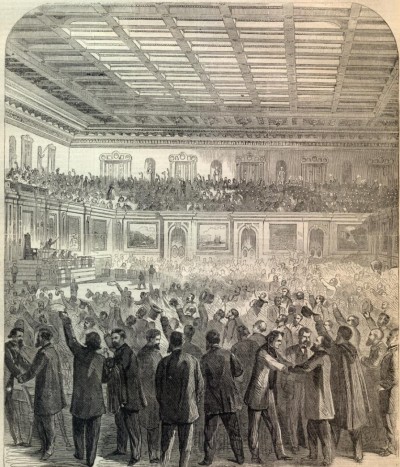 |
|
The Attack
on William
Seward
Seward was already
hated by many southern bigots for his
fervent support of Lincoln's anti-slavery
policies over the past four years of
Lincoln's first term. Now the South
blamed Seward almost as much as they did
Lincoln for the passage of what was called
the "Slavery Amendment". They were
well aware it had been Seward's dirty tricks
that had swung the vote. When
John Wilkes Booth decided to organize the conspiracy
to murder Lincoln, the men targeted William
Seward as well.
Very few of us know
our American History well enough to know
what happened to Seward on the same night
that Lincoln was assassinated. It is
actually an incredible story.
On the night of
April 14, 1865, Lewis Powell attempted to assassinate William Seward at his
Washington D.C. home. The attack
took place on the same night
that John Wilkes Booth successfully
murdered Abraham Lincoln.
Lewis Powell, also
known by his alias "Lewis Payne", was
a co-conspirator of John Wilkes Booth.
The two men had planned to attack
Lincoln and Seward on the same night.
There was a third
man involved as well. George
Atzerodt was recruited by Booth into the
conspiracy to kill Vice President Andrew
Johnson. However Atzerodt lost his
nerve and stayed in a hotel bar that
night. He stuck to drinking
instead. Ironically Atzerodt was
executed anyway. After what
happened to Lincoln, no one was in much
of a forgiving mood. In July 1865, three
months after Lincoln's assassination, Atzerodt
was hanged .
The South had
surrendered only five days earlier.
Regarding the conspiracy, it made sense
to carry out the executions
simultaneously.
Once the element of surprise was gone,
no one would get a second chance at any
of the targets.
The stated point
of attacking the three men was to sever
the continuity of the United States
government. However, what the assassins
expected would happen after that is
anybody's guess. The real purpose
of the attack was probably no more
complicated than a chance to get some
much-desired revenge on the men who set
the slaves free and conquered the South
in the war.
By chance, William Seward had been badly
wounded in a recent
carriage accident. Just nine short
days before the attack, the door to the
Seward's carriage flew open as he
traveled not far from home. When the driver dismounted
to secure the carriage, the horses
suddenly bolted.
Seward leapt out
of the carriage in a desperate attempt
to grab the reins. Instead, he
lost his balance, fell hard and blacked
out. He was carried back to his
house unconscious. The results
were pretty grim. Seward had
suffered a concussion plus he had fractured his
lower jaw as well as his right arm.
The
doctor considered Seward's condition
“perilous in the extreme” and confined
him to bed rest at home.
Due to the
accident, the assassin Lewis Powell not
only knew right
where to find Seward, he figured the man
was a sitting duck.
Powell gained access to the
Seward home by telling William Bell, the butler, that
he was delivering medicine for Seward
from Dr. Verdi, Seward's personal
physician. Seeing the polite,
handsome, well-dressed man at the door, Bell, a longtime family
servant, never suspected a thing.
He let
Powell inside.
Upon entry into the home, Powell began
to climb the stairs with his gun in his
pocket.
Powell's progress
was stopped at the top of the stairs by
Frederick Seward, one of Seward's sons. Frederick,
35,
explained to Powell that his father was asleep.
Why not just leave the medicine with
him? Frederick promised he would take the
medicine to his father when he awoke.
Powell complained
that only he was to administer the
medicine. That didn't work. Frederick Seward remained
unmoved. "I am sorry, but I will
not allow you to disturb my father's
sleep. Please hand me the medicine."
Now Powell was
stuck. He had not thought to bring
any fake medicine along to bolster his
story. Unsure of what to do,
Powell turned around and slowly began to
descend the stairs.
Powell
gave it some quick thought. He reckoned they would
wonder why he didn't hand over the
medicine. Surely they would suspect
that he was a fake. In that case,
they would increase the guard around
Seward. Powell
reached the conclusion that this moment would be his
only real chance.
|
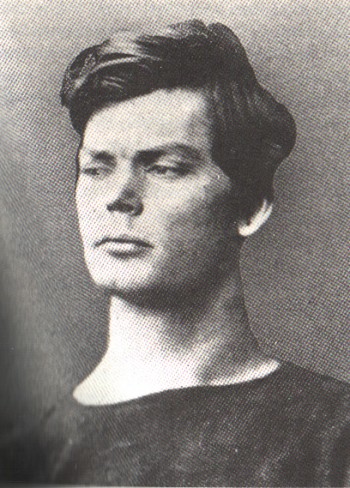 |
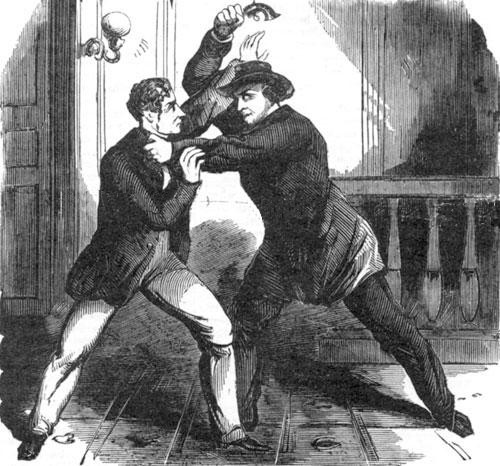 |
Powell
suddenly swung back
around, drew out his pistol, and shot it at
Frederick's head. Nothing
happened. The pistol
misfired.
Realizing he needed to act
quickly, Powell rushed to the top of the
stairs. Now a fight broke out.
Powell began beating Frederick
over the head with the barrel of his
gun. The force of Powell's blows
crippled Frederick Seward and left him
sprawled on the floor lying unconscious in a pool of
blood.
Immediately after
knocking Frederick senseless,
Powell tried to get his gun to work.
To his dismay, Powell discovered the gun
could not be fired. He had damaged
the gun when he used it to beat Frederick
Seward. The gun seemed
hopelessly jammed.
Now a door
in the hallway opened. It
was Seward's daughter, a frail
and slender woman named Fanny Seward, 21.
She had been in her father's
room keeping him company along
with her older brother Augustus,
39, and Sgt. George Robinson, a
body guard and military nurse.
Hearing
the loud noises coming from the
second floor hallway, Fanny
wanted to see what was going on.
Fanny gasped when she saw her
brother Frederick slumped on the
floor. Then Fanny was
horrified to see a wide-eyed
Powell pull a knife from his
pocket and charge directly
towards her with the dagger in his
hand. She screamed in
terror.
|
Powell didn't stab
Fanny. Instead he grabbed
her and threw her down to the floor like a rag doll. Then he burst through
the door and immediately jumped onto Secretary Seward's
bed. Powell began to stab Seward in the face
and neck area. However, he didn't
get very far. Thanks to Fanny's
screams, Augustus Seward and Sergeant
Robinson had already been rising out of
their chairs to meet the threat in the
same moment
Powell entered the room.
Powell's slashing attack on
Seward was interrupted
when both men rushed to Seward's aid.
Forced to defend himself, Powell forgot
about Secretary Seward and lashed out at
the two men with his knife.
Powell was able to
stab both men.
However, the
hallway was full of sounds indicating there
were other people coming. Hearing
the
people in the hall, Powell knew he had
only moments to make his escape. Seeing Secretary
Seward bleeding profusely
from his wounds, Powell concluded the
man had to be dying. Powell didn't have time
to look twice; it was now or
never. Concluding it was time to go, Powell
jumped over Fanny lying dazed in the
doorway and raced to the stairs.
As Powell
fled down the stairs, he was
confronted by yet another man racing to
help Seward. Emerick Hansell had just
entered the
house. He had come to deliver a message to William
Seward and heard the sounds of the fight
upstairs. Now he found himself on the
stairway blocking
Powell's desperate attempt to escape. Yet
another fight broke out. Powell
stabbed Hansell in the back, crippling
him instantly.
Finally Powell was
free to escape. However he was in for a
surprise. Powell was furious to see
his accomplice had fled during the
screams and commotion, taking both
horses with him. This meant Powell was forced
to flee on foot, preventing him from
leaving town as had been his plan.
On foot, he didn't get very far.
Powell was
captured the next day at the DC
boarding-house home of Mary Surratt.
He
was executed along with Atzerodt three months later for his
actions.
After Sergeant
Robinson was able to recover, he rushed
to Seward's side. Judging from the
amount of blood, Robinson assumed Seward
was dead. Amazingly,
Secretary William Seward had survived.
Apparently the jaw splint worn by Seward
to hold his broken jaw in place helped
save his life by deflecting the knife
away from his jugular vein.
Although Seward would carry deep facial
scars for the rest of his life, he
eventually made a full recovery.
Seward's family had bravely saved his
life. First
Frederick had halted the progress.
Then Fanny's screams had warned the men in
the room. Then the bravery of Seward's son Augustus and
Sgt. Robinson had prevented Powell
from having enough time to strike a
killing blow.
Unfortunately
Seward's family and circle of friends paid a heavy price.
Although neither Augustus Seward or George
Robinson were badly hurt, it was a
different story for Frederick.
He lay in a coma for several
days. Eventually he too recovered.
It was Emerick Hansell who was
hurt the worst. Hansell was
rendered permanently paralyzed from the
stabbing.
There were other
dire repercussions as well. The events
of that night upset Seward's wife
Frances terribly. Her health declined
rapidly after the attack. She
died just two months later.
Seward's
daughter Fanny was frail to begin with
and the trauma weakened her further. Fanny too fell ill soon after.
She died of tuberculosis a year later.
Not surprisingly,
the wounds, the
tragedy of losing his friend Lincoln and the
tragedy of seeing his entire family devastated
took a huge toll on Seward.
It took tremendous courage to get
through the pain and the depression of
this dark time in his life.
After Lincoln's
assassination, from his hospital bed, Seward
agreed to stay on to help President Andrew
Johnson.
Although it took Seward several months to
recover from his wounds, Seward was able to
shake off that terrible
night and carry on.
After Seward reclaimed his
position in the administration of
Lincoln's successor, Andrew Johnson, ironically
he became one of the few
decent men in the inept Johnson
Administration in regards to the South.
Seward frequently suggested more moderate
reconciliation policies towards the
South to the point of enraging the Radical
Republicans who had once regarded Seward
as their ally. They could not
understand why the man who had been so
opposed to slavery now wanted to go soft on
their Southern enemies.
The South didn't
care what Seward thought or did. They still associated Seward with
Lincoln and continued to hate him. In
fact, no one liked him. His own
political party wanted to disown him and the
new
President Johnson didn't particularly
want Seward around either.
However, after the suffering Seward had been
through, Johnson could not figure out a
graceful way to get rid of him, so Seward
lingered on.
With Lincoln gone and
few remaining allies, Seward's political
star power dwindled dramatically. From
that point on, Seward had little choice but
to work behind the scenes and exert a
steadying influence on the Johnson
Administration.
Now that the war was
over, Seward turned his attention to the
traditional role of Secretary of State:
Foreign Relations. He immediately
renewed the negotiations on the purchase of
Russia that had been on hold since the start
of the Civil War.
Unfortunately,
Seward's waning political power and
America's total lack of interest in the
frozen wilderness would make this a very
difficult deal to sell to Congress.
Seward was facing another huge uphill struggle.
|
The
1867 Alaska Purchase
The story of the
Alaska Purchase is very interesting. William
Seward had long been an advocate of American
Expansion. His dreams didn't just stop at
the Pacific shores of California.
As
far back as 1846, Seward had said, "Our population is destined to roll its
resistless waves to the icy barriers of the
north, and to encounter oriental
civilization on the shores of the Pacific."
It was now twenty years later. With
the Civil War ended, Seward was finally
able to pursue his dream.
On a political tour in the summer of 1867,
to vigorous applause Seward told an audience in Hartford that the people of the
United States had before them the “most
glorious prospect that ever dawned upon
any nation on the globe.”
Seward spoke of a free nation
“extending from the Atlantic to the Pacific
Ocean and approaching the shores of Japan
and China.”
That said, it isn't easy to lead when you
are so far out ahead of the pack you can't
even see if anyone is behind you.
Seward was pretty much on his own when it
came to Alaska.
|
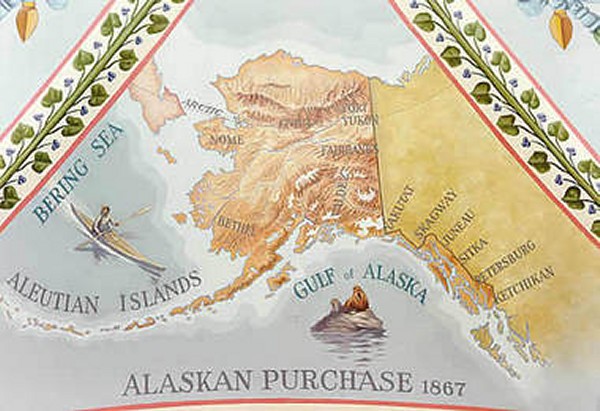 |
 |
Seward's
Folly
As we all know
today, the Alaska Purchase
was without a question one of the greatest real
estate steals in history. For the princely sum of 2 cents an
acre, the United States government
effortlessly acquired this vast
northern paradise.
Just on size
alone, one would wonder why so many
people objected to the deal. In a
word, Alaska is gigantic.
After acquiring Alaska, the USA
immediately grew in size by 20%.
Alaska is
so big that is twice the size of Texas.
Alaska is also larger than
all but 18 sovereign countries. For
example, Alaska is bigger than France,
the second largest country in
Europe. The fishing rights
alone made this a terrific deal. Alaska
by itself has more "coastline"
than all the other 49 states put
together.
One would think Seward
would be praised so such a great
acquisition. Not so. U.S.
Secretary of State William Seward was
severely criticized for his "colossal
mistake". Calling the deal "Seward's
Folly", the press labeled Seward
a fool.
For example,
The New
York Tribune's Horace Greely claimed
"Alaska
contains nothing of value but
furbearing animals, and these
animals
have
been hunted until they are nearly extinct.
Except for the Aleutian Islands and a narrow
strip of land extending along the southern
coast, the
land would not
even be
worth taking
as a gift."
|
The newspapers
suggested Seward had paid way too much
money. Seward was lambasted for
"his brains of mush to buy this worthless
icebox".
Amazingly, our own Senate pretty much agreed
with the newspapers. Seward had great
difficulty making the case for the purchase
of Alaska before the Senate. In the
end, the Senate would ratify the treaty on April
9, 1867 by a margin of just one single vote.
The Crimean War
Of course 150 years
later it is effortless for us to
see who got the better of the deal.
Consequently one
might wonder why Seward took so much heat
for his controversial move.
Let's take a moment to look at the positions
of both parties at the time of the deal.
It was actually the
Russians who first proposed the deal.
Russia was having major economic troubles.
Russia had just finished fighting the costly Crimean War with
England, Turkey, Italy and France in a losing effort.
Now Russia was desperate for an infusion of money for rebuilding.
|
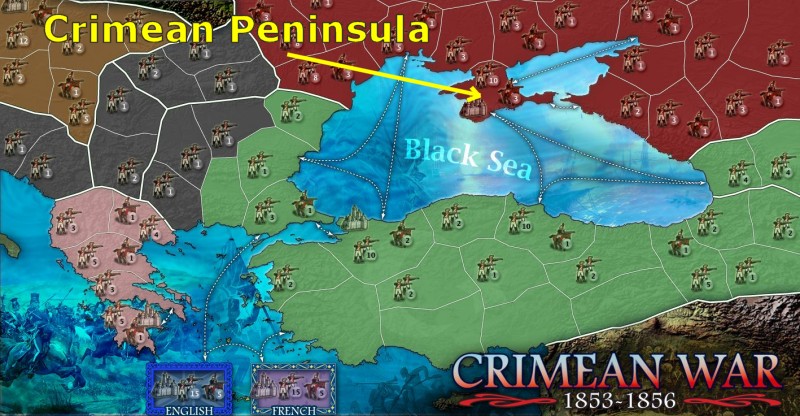 |
Negotiations
had begun after the end of the Crimean War,
but understandably were put on the
backburner when our own Civil War began. When the war
ended, both parties began to talk again.
Tsar Alexander
II of Russia decided to sell the
country's territory in Alaska for
several reasons.
Alaska was
expendable because it was virtually worthless to the
Russian government. Plain and simple,
Russia wanted to make a deal because it
owned more land than it could handle.
Another reason
they were willing to sell is due to
the fact that they barely even
knew what they had!! The
Russian tsar had almost no sense of
the true value of the Alaskan
frontier.
In 1725, a few weeks
before his death, Russia's Peter the Great
wanted to determine if far eastern Siberia
was attached to the North American
continent. So Peter dispatched Vitus
Bering, a Danish-born sailor, to find out.
In his first expedition, Bering determined
that Asia and North America were indeed
separated by the narrow strait that now bears his
name.
However, he did not sight
Alaska on his first trip. It was not until 1741 on Bering’s
second expedition that he made landfall
there. Due to a storm,
Bering's ship was forced to take refuge on
what is now called Bering Island. It
was there that the explorer died of scurvy
at the age of 60, along with many of his
crewmen. The survivors, however, made
it back to Siberia with sea otter pelts,
among the most valuable of furs.
It would be the fur trade that would draw
the Russians to Alaska.
|
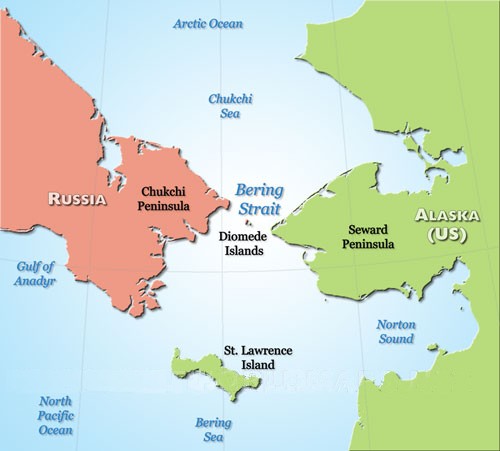 |
Basically when the
1860s rolled around, the only people who had any
real
interest in Alaska were its inhabitants.
Besides the few hundred Russian fur traders,
there were 8,000 indigenous
people - Inupiaq, Yupik, Aleut, Eyak,
Tlingit, Haida, Tsimshian. Sadly, the
governments of Russia and the United States
were in no mood to care what they wanted.
Why Europe even recognized
Russia's claim to Alaska is still a bit of a
mystery to me. The truth is that
Russia really didn't have much a claim.
You can't just stick a flag in the ground
and say the land is yours. Besides
visiting the place, you have to
populate and colonize the place. Basically
Russia owned the land because it was much closer
to it than any of the other European powers.
Plus it had all those important fur traders
to legitimize their claim.
Alaska was the Land
Beyond Beyond. Due to its remote
location, Alaska was about as important as
Mars back in those days. For example,
just recently we have begun to show interest
in Mars, right?? Well, back in
those days, Alaska seemed almost as remote
to the American people as Mars does today.
After all, the Alaska
Territory was 500 miles north of Washington,
the nearest American state. Unless for
a few dozen fur traders and perhaps a couple
explorers sent there by the government, no
American had ever visited the place.
All the American people knew was that it was
supposed to be a big worthless chunk of ice.
In those days, the US population
was a lot more interested in the Wild West
than the Frozen North. Our population had
just barely begun to expanded into areas like America's
west and the Canadian people had certainly
not expanded to the Canadian west other than
Vancouver. Nor did any Russian people
other than the fur traders care about the
place.
Alaska was located across the Bering Strait
from the Siberian territory of Kamchatka
which was part of the immense Siberian
forest.
Kamchatka was virtually deserted.
Anyone who lived in Kamchatka could have
cared less about the vast icy expanse across
the water... they already had a vast icy
expanse of their own.
Tsar Alexander
II already had a vast frozen
wilderness known as Siberia.
What did he need Alaska for?
The problem
was finding a buyer. Back in those days,
nobody wanted Alaska because nobody needed
Alaska. Not only did the Russians
care less about Alaska, nobody else cared
either.
Russia understood that
someday someone would want that land.
And when that time came, Russia would not be
able to sufficiently defend the territory
from invaders. This was a very
important factor.
Back in those days,
Russia had not even begun to populate
Siberia. Siberia was a vast Asian
forest east of the Ural Mountains, a huge
mountain range similar to the Rockies that
divides Asian Russia from European Russia.
With
virtually no people living on the Pacific
coast of Siberia and certainly no navy, how
exactly was the Czar supposed to hang on to
the Alaskan wilderness? Unless
those fur traders were tougher than 10 Davy
Crocketts, even the smallest well-armed
military force would take the area with
little effort.
|
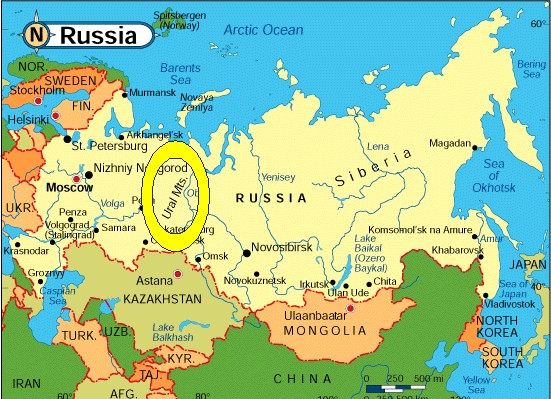 |
And how would Russia
send reinforcements?? For
example, there was no such thing as a train
that crossed the vast Siberian tundra.
Traveling in wagons by land, it
would be months before the Czar could get an
army over there. Nor was there any
sort of Panama Canal that could be used to
send warships to the area. Hanging
onto Alaska was hopeless.
The Czar reasoned that
they would be better off selling the
territory now than waiting for it to be
annexed by another country. It was just a
matter of time... better to unload it now or
get nothing in return. Russia
already had one potential buyer - England.
However Czar Alexander didn’t want
strengthen the British by selling it to
them. Russia and Britain, after all,
had been at war in the Crimea from 1853 to
1856. Russia had been badly trounced
after discovering the British navy was far
superior to the Russian navy and its
military superior as well. That damn Britain was the reason
Alexander needed money in the first place. Alexander had a better idea.
Why not offer the territory to a country that was no
threat to Russia?
So Czar
Alexander II offered to sell the land to the
United States. He sent a Russian diplomat to
enter negotiations with the Buchanan
Administration. When the Lincoln
Administration took over, William Seward
picked up the thread.
Let's Buy Antarctica!!
So what exactly was
the American point of view? Look
at it this way in modern terms. Assuming it was even
possible, do you think the U.S. should
purchase the Antarctic?
Now there may
come a day when scientists discover
incalculable riches underneath the frozen
ice, but at this particular moment in time,
owning the Antarctic doesn't seem particularly
tempting. What would you get, a bunch
of penguins and tons of ice that is melting rapidly??
Using this example, you get in touch with
the same point of view most people held for
Alaska in the 1860s. Why bother??
This analogy helps to
explain why the Americans of the 1860s could have cared less about
spending a lot of money for what seemed like little in return.
Furthermore, let us not forget that America had just
begun its westward expansion. There was
the Utah territory to develop, there
was the Texas territory plus Colorado,
California and Oregon... and so on and so on. With
all this empty frontier before them, why
should anyone care about Alaska??
|
 |
In addition, there
were a lot of people who whispered we could
get Alaska for free any time we wanted to. Why
spend all that money?
After all, the United States had virtually
stolen Texas from Mexico in 1846. Why
couldn't we do the same thing with Alaska
when the time was right? Might makes
right!
Taking Alaska by force
wasn't a very practical idea. The
thing to keep in mind was that America was
hardly the military power in 1865 that it is
today. It was one thing to invade
Mexico with whom we shared a border.
How were we supposed to invade a distant
land like Alaska?
America was in the same
position in 1865 that Russia was in.
We had no railroad across the American
continent. We had virtually no people
on the West Coast. We had no navy to
speak of and we had no Panama Canal.
With no army and no navy, how exactly was the United States supposed
to annex a distant land like Alaska by force?
Furthermore, if
America did suddenly show a military interest in
Alaska, England was in a far better position
to get to Alaska first. England
actually had ships in the area. Thanks
to a series of amazing English naval
explorers such as Francis Drake and James
Cook, the English knew more about the
Pacific than the United States did.
For example, the English sea captain George
Vancouver had explored the area now named
after him as far back as 1792. Thanks to that early
foothold, the British had been colonizing
the Vancouver area on the Pacific coast of British Columbia for the
past 60 years.
So look at it this way. In
the 1860s the port of Vancouver was already
a thriving, albeit distant, outpost.
If the U.S. ever attempted to take Alaska by
force, England could very well view the
hostile action as an opportunity to use its head start in the area to take
the territory for themselves. After
all, the British might enjoy having one
united land extending from the Atlantic to
the Pacific. Once in, the
English would be very difficult to dislodge.
Besides, the U.S. was
hardly in a fighting mood. In 1867,
America was weary from its own Civil War.
So making a deal made a lot more sense than
picking a new fight.
Russia was offering
to let America have the first crack at this
vast region. Okay, so the United
States had no immediate need of the area,
but it might have use of it someday.
And we sure didn't want the British to have
more control of the area than they already
did. The British Empire was at its
peak; God forbid they would get
stronger because we passed on an
opportunity. Why not do the sensible thing and
take the frozen Alaska wilderness off
Russia's hands for a price that amounted to
beans?
That may make complete
sense to us today, but back then Americans
weren't used to thinking globally. Unfortunately,
since no one in America had any use for the
place, Seward had a difficult time selling
his idea. Very few Americans saw the
"Big Picture" as clearly as Seward did.
Another problem was that Seward's political
clout was at low ebb. Seward was
extremely unpopular with the South due to
his well-known staunch opposition to slavery.
As Lincoln's right hand man, Seward had been
hated almost as much as the President.
Furthermore, now that
President Andrew Johnson was in power,
Seward had perhaps the weakest President in
U.S. history behind him. Thanks to
Johnson, the atmosphere in Washington at the
time was poisonous. President Johnson
was in the midst of being impeached by the
House of Representatives. Therefore when it came
time to persuade
Congress to buy Alaska, Seward couldn't
count on any help from the South and he
couldn't count on any help from his own
President.
How was Seward going
to sell Alaska to the United States
Congress?
American
Destiny
The phrase
"Manifest Destiny" is most often
associated with the territorial
expansion of the United States from
1812 to 1860. This era which runs
from the end of the War of 1812 to
the beginning of the American Civil
War, has been called the "Age of
Manifest Destiny".
|
During this
time, the United States expanded to
the Pacific Ocean and created the
borders of the contiguous United
States as they are today.
Things
happened very fast in 1846.
First President Polk signed a treaty
with Britain that established a
permanent Canada-US border in the
Oregon Territory.
Then the
Mexican-American War of 1846 gave
the United States exactly what it
wanted - the entire land West of the
Mississippi including Texas and
California.
These
far-reaching lands would become ten new
states: Texas (1845), California (1850),
Kansas (1861),Nevada
(1864), Utah (1896), Colorado
(1876), Wyoming (1890), Arizona
(1912),
Oklahoma (1907), and New Mexico
(1912).
The United
States paid Mexico $15 million in
return, a ridiculously low sum
considering the value in return.
|
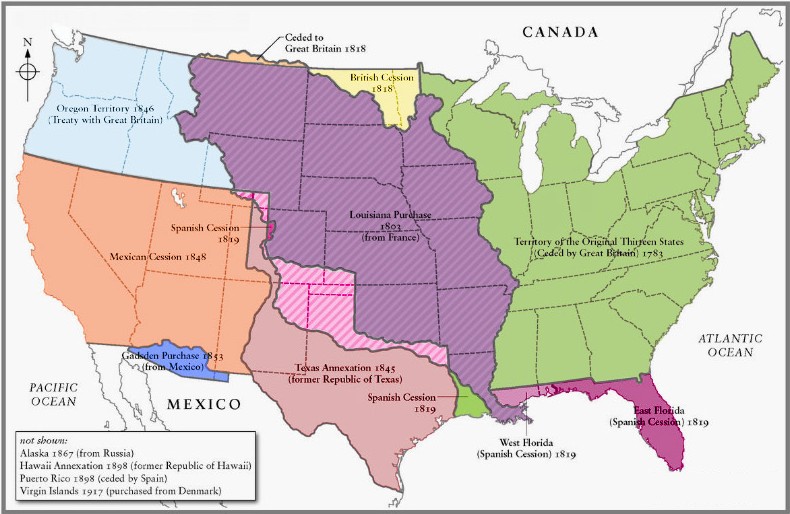 |
This deal was
basically highway robbery, but there
can be no doubt it was a defining
moment in our history. For the
first time, the United States truly
stretched from sea to shining sea.
Oddly enough, the
concept of Manifest Destiny worked against
the purchase of Alaska. Most Americans
were perfectly content now that our borders
finally reached the Pacific.
With
American feeling fat and happy thanks to
adding Texas, Oregon and California, the
sentiment towards acquiring Alaska was total
apathy. We had more land than we knew
what to do with and couldn't care less about
acquiring a new territory such as Alaska.
Why even bother? Keep the money.
Nor was the press helping much. The
press had a field day with this suggested
Alaskan purchase. Not a day passed
without Seward being ridiculed in the press
for "Seward's folly", "Seward's icebox", and
President Johnson's "polar bear zoo".
Things were looking
pretty grim. This deal was looking
colder than Alaska. So how exactly
was Seward ever going to light a fire under this
deal??
|
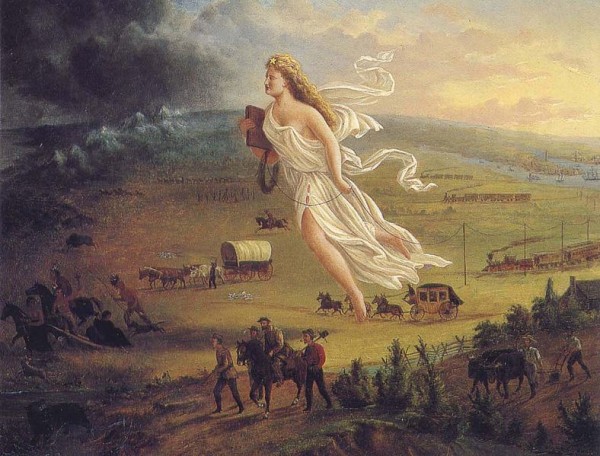 |
Those Damn British
In the end, Seward
knew exactly which button to push. It was
anti-British sentiment that carried the day.
Resentment towards the
British was very much a part of
American politics at the time thanks to
constant British intimidation throughout the
Nineteenth Century. England may
have lost the Revolution, but it had
continued to be a bully ever since.
The British had
spent this entire century dominating the new-born
USA in practically every
sphere possible - on the seas, on the land,
and in diplomatic circles.
The best example was
the War of 1812, a war that no modern
American has a clue about (including me).
I was surprised to learn the United States
actually started the war. Big mistake.
England was still pretty angry over losing
the Revolution. Therefore they made
the War of 1812 a sort of "revenge war".
So England
decided to give
America a thorough spanking in the War of
1812. About the only good thing to
come out of that war was our national anthem
which Francis Scott Key wrote while the
British devastated the harbor of Baltimore.
It is hard to believe
the United States was
stupid enough to go toe to
toe with the mightiest power in the world.
According to Wikipedia,
"The United States
declared war in 1812 for several reasons.
America resented trade restrictions brought
about by Britain's continuing war with
France, the impressment of American merchant
sailors into the Royal Navy, British support
of American Indian tribes against American
expansion, outrage over insults to national
honor after years of humiliations on the
high seas, and possible American interest in
annexing Canada."
In other
words, the United States was tired
of being pushed around by the
British plus they were interested in
gaining control of Canada.
Meanwhile the
British relished the opportunity to
get some payback. They had even
had the nerve to invade
Washington DC. While they were there,
they burned down the White
House. Did they need to burn down the
White House? No, it
served no military purpose.
The British did it out of spite.
Well, the USA
may have lost its White House, but
Seward flipped that loss to help
gain Alaska 50 years later. To fan the
anti-British sentiment, William Seward recruited
a valuable ally, Senator Charles Sumner of
Massachusetts.
Sumner was a clever
man. He gave a passionate speech to
the Senate that closed the deal. First, Sumner
reminded everyone about the War of
1812. Good move. The serious
butt kicking of 1812 was still within the living memory
of many people in Congress, so that got
their attention.
Then Sumner
appealed to everyone's patriotism.
He pointed
out that America was destined to see
the whole of the North American continent
under the American flag. Conveniently
ignoring the fact that Britain
firmly controlled Canada, Sumner
declared that “our American Destiny can be nothing
less than owning the entire North American continent.”
|
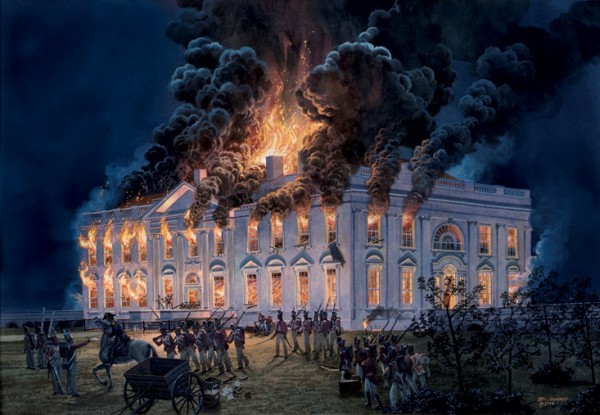 |
Next Sumner drew a
parallel with the Roman Empire. He
said the ancient Roman senate held sacred a
rule that barred foreign kings from entering
the gates of Rome. By purchasing Alaska,
Sumner argued we would “dismiss one more
monarch from this continent.” Sumner noted
that French kings and Spanish kings had
already departed from North America and now
the Tsar of Russia wanted to leave as well.
Sumner's implication
was clear that with the Alaska Purchase,
Britain's Queen Victoria would be next to go.
Heads nodded.
Okay, so our ill-advised 1812 Canadian land
grab failed, but swiping Alaska out from
under Britain's nose would be a real payback.
Just the thought of how irritated the
British would be warmed the hearts of every
vengeful senator.
You would assume
Sumner's passionate speech would guarantee an easy
passage of the bill. Wrong. Even
after Sumner's speech, the motion
still barely passed
by one vote.
And even then the result
was mired in controversy. There is
strong evidence that several bribes were
necessary to change votes on the issue. Seward
had learned from his dirty work getting the
Thirteenth Amendment passed that when it
comes to senators, money works faster than
appeals to patriotism. Some things
never change.
Does the end justify
the means? Good question.
I would say in the case of the Thirteenth
Amendment and the Alaska Purchase, yes.
Fortunately for
the country, Seward got his way. But
that didn't mean the press eased up on him.
"Seward's Folly" became the Jay
Leno laugh monologue
of the day.
It didn't help Seward's cause that Alaska got off to a slow start
after the purchase. You might even say
the pace was glacial. Like a farmer who
purchases a giant plot of land he doesn't
need, this giant land mass just
sat there doing little more than collect more snow and ice.
With each new snowdrift, the newspapers continued to ride
Seward unmercifully.
It wasn't until gold
was discovered in 1898 that people changed
their tune. After that, Seward didn't
seem quite so stupid any more. Only
one problem - Seward had been dead for 26 years.
No last laugh or "I told you so" for him.
As we all now know,
for the bargain price of $7.2 million, in one simple
stroke of a pen, America was instantly 20%
larger. This country had just obtained
365 million acres of land at slightly less than two
cents an acre. Once Alaska proved to be
unbelievably rich in natural resources, it
became obvious that Seward had known what he
was doing all along.
Over the last 140 years, we have taken
untold riches in gold, oil, and other
minerals out of the ground and billions of
dollars worth of fish out of the surrounding
waters. And yet with a population of only
one person per square mile, Alaska is still
in a very real sense the last American
frontier, a land rich in wildlife, open
spaces, and incomparable natural beauty.
Gaining
Alaska gave the United States the most diverse national territory in
the world. The USA is the only
country whose territory encompasses arctic,
temperate, and tropical areas. Today all Americans are justly proud of that
this beautiful icy paradise in the north is
an important part of our country.
Alaska is just as much a part of the USA as Texas is.
|
 |
 |
I think of Seward as an
"American Prometheus".
Prometheus, of course, was the Greek God who
stole fire from the Gods and gave it to the
humans. He did it because it was the
right thing to do. However, he paid a stiff price. For his courage, the Gods chained
Prometheus to a rock and allowed him to be
eaten alive by the eagles.
Thinking of how Seward must have been torn
to pieces by all the criticism and hatred, I can easily
see a parallel between Seward and
Prometheus, two men who were tortured for
doing the right thing.
Like Lincoln, like Jefferson, like FDR, like
Benjamin Franklin - the men we refer to most
often as America's "visionaries" - Seward
seemed to understand that his ideas were way
ahead of America's thinking at the time. When
asked what he considered to be his greatest
achievement as Secretary of State, Seward
replied "The purchase of Alaska—but it will
take the people a generation to find it
out".
Seward's contemporary Carl Schurz described
William Seward as "one of those spirits who
sometimes will go ahead of public opinion
instead of tamely following its footprints."
|
After World War II, Seward’s wisdom in
buying Alaska would be even clearer.
In the second half of the Twentieth Century,
the great geopolitical struggle between the
United States and the Soviet Union dominated
the international politics.
In 1867 Alaska had been a remote and
expensive tidbit of empire that the Russian
government was only too glad to get rid of. A hundred years later, the Soviet government
must have bitterly regretted its sale for a
pittance.
The Cold War would have
been fought very differently — and would have
been much harder to win — had the Soviet Union
possessed a major foothold on the North
American continent.
Seward wasn't around to see American opinion
turn around because he died in 1872, just
five years after his greatest triumph. I think it sad
to know he died without being vindicated for
his vision.
Fortunately, I believe Seward was so
confident that he didn't need the adulation
of the American Public to know that he had
been right all along.
Somehow I get the feeling that gaining
popular approval was not important to
Seward. He was one of those men who
always did the right thing for America no
matter what the consequences. Too bad
our government doesn't have more men like
him.
|
|
|